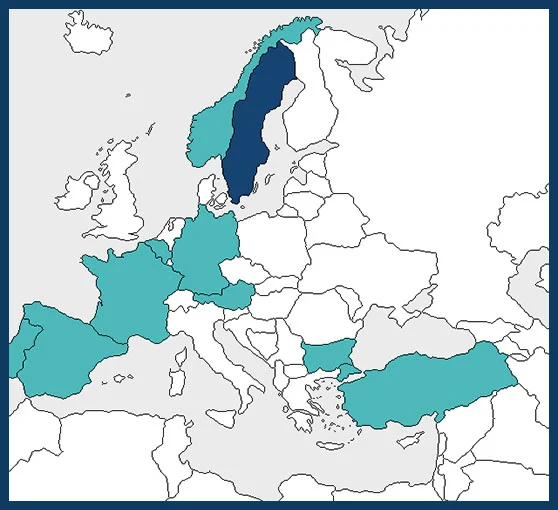01-2014 to 12-2016
€ 1 890 394
Jan Stenlid – coordinator
jan.stenlid@slu.se
Johana Boberg
johanna.boberg@slu.se
Jonàs Oliva
jonas.oliva@slu.se
Swedish University of Agricultural Sciences – SWEDEN (Coordinator)
Federal Research and Training Center for Forest Natural Hazards and Landscape – AUSTRIA
Institute for Agricultural and Fisheries Research – BELGIUM
AgroBioInstitute – BULGARIA
Anses, Plant Heatlh Laboratory – FRANCE
INRA Bordeaux – FRANCE
INRA Nancy – FRANCE
Julius Kühn Institute – GERMANY
Norwegian Forest and landscape institute – NORWAY
Norwegian Institute for Agricultural and Environmental Research – NORWAY
University of Algarve – PORTUGAL
Centre Tecnològic Forestal de Catalunya – SPAIN
Swedish University of Agricultural Sciences – SWEDEN
Plant Protection Central Research Institute – TURKEY

Invasive alien species pose a serious global threat to biodiversity by competing with native organisms for limited resources and by their ability to modify entire landscapes. Invasions of forest pathogens generally occur at a large scale affecting tree species with a widespread distribution in Europe.
RESIPATH will work on tree species currently threatened by different invasive pathogens (i.e. elm, ash, alder and oak). The selected tree species are not only an integral part of their ecosystems but are also economically important and supply crucial environmental services to European society, such as biodiversity, watershed protection, stabilisation of river banks, as well as recreational and cultural values.
Although widespread, the different invasive pathogens to be studied here have not yet affected the entire tree population in Europe. Working at a European scale will allow studying invasions at different stages and along gradients far exceeding those obtained at a national scale. Due to different mortality patterns, it is possible to study the differential effects on both host and pathogen population in terms of demographics and evolution.
RESIPATH aims at studying how European forest communities have been affected by and responded to invasive pathogens and also to develop means to mitigate their impact. More specifically, RESIPATH aims at achieving the following goals:
• Developing an early detection system for invasive fungal and oomycete pathogens
• Investigating how the pathogens are introduced and spread.
• Assessing whether the selected pathogens threaten the long term sustainability of tree populations in Europe
• Understanding the mechanisms involved in adaptation of forest tree populations to new pathogens
• Assessing the mechanisms of hybridisation of invading organisms in Europe
• Gaining knowledge on know how public perception are related to objective data and how mass media messages influence citizen opinions about pathogens invasion.
To address the challenges of the high ecological and economic impact caused by invasive pathogens RESIPATH will develop an early detection and warning system and contribute to increase knowledge on the importance of different pathways for their introduction and spread.
RESIPATH also aims at encouraging fast response from the society in front of invasive pathogens, considering that an efficient response from society to mitigate the impact of invasive pathogens depends on the public perception and the communication between researchers and stakeholders in society. Part of the work conducted will therefore consist in investigating how the public perceive invasive pathogens in different European countries, how the perceptions are related to objective data and how mass media messages influence citizen opinions.